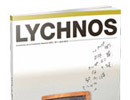Issue 5 of the Journal of Lychnos, published in June 2011, is a special issue on frontier research, one of the Fundación General CSIC’s four strategic lines.
The issue starts with an article by Fernando Broncano (Carlos III University, Madrid), who offers some reflections on knowledge and research at the frontier.
 The frontiers of knowledge on the subject of matter and energy are represented in the next section, starting with an article by Joaquín Sánchez from the Centre for Energy, Environmental and Technology Research (CIEMAT), who describes the role fusion energy may play in the future. Álvaro de Rújula, one of the leading researchers on the CERN team which launched the Large Hadron Collider in March, discusses the implications for research if it is proven that the Higgs boson does not exist. Finally, Enrique Álvarez gives Lychnos’s readers a taste of string theory.
The frontiers of knowledge on the subject of matter and energy are represented in the next section, starting with an article by Joaquín Sánchez from the Centre for Energy, Environmental and Technology Research (CIEMAT), who describes the role fusion energy may play in the future. Álvaro de Rújula, one of the leading researchers on the CERN team which launched the Large Hadron Collider in March, discusses the implications for research if it is proven that the Higgs boson does not exist. Finally, Enrique Álvarez gives Lychnos’s readers a taste of string theory.
The third section of the journal takes us on a journey of exploration through the universe. With their articles, Enrique Gaztañaga (Space Sciences Institute), David Barrado-Navascués (Calar Alto Observatory) and Antxon Alberdi (Andalusia Astrophysics Institute) introduce the topics of dark energy, extrasolar planets or exoplanets and large astronomy facilities, respectively.
Frontier research at the limits of science is the subject of the fourth section. Javier Maciá and Ricard Solé (Pompeu Fabra University) reflect on the present and future of synthetic biology. Meanwhile, Antonio Acín (Institute of Photonic Sciences) discusses quantum information theory and its applications. Next, Enrique Turiégano (Madrid Autonomous University) explains how physiological differences between individuals may shape decision-making. And finally, Manuel León (institute of Mathematical Sciences) identifies and analyses the challenges faced by mathematics in the 21st century.
The fifth section is devoted to frontier research in studies of society and culture. Javier Moscoso (CSIC) discusses the state of play in the human and social sciences with regard to frontier research. Nùria Sebastián (Pompeu Fabra University) centres her article on a series of questions concerning the study of the acquisition and processing of language. Finally, Peter Wagner, at the University of Barcelona, reviews the ways in which sociology and philosophy have sought to understand modernity, so as to help us better understand the present.
In the Forum section, Javier Rey, Director of the Fundación General CSIC, invites us to reflect on frontier research, which he says has the capacity to bring the future to the present, even when the researchers actually doing the research are unable to predict it.




